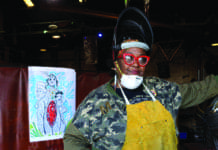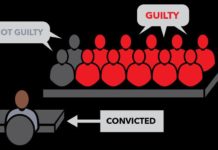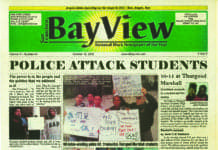by Orissa Arend

So much for top-down problem solving. How about some ideas from the bottom, which unfortunately is where students often find themselves in the decision-making food chain of the public school system. The press conference held by Rethink: Kids Rethink New Orleans Schools on July 24 at an art gallery in the 7th Ward sent a signal that that may be changing.
Recovery School District Supt. Paul Vallas, as well as four school principals, the head of Capital Improvements for the Recovery School District and other dignitaries listened for two hours and took copious notes as 19 middle school Rethinkers and a few younger Prethinkers – standing on chairs to reach the microphone and snapping pictures with cameras about a third as big as they were – presented the findings of their extensive research on what school lunches and school cafeterias should consist of. “After all,” said 8-year-old George Dixie Carter III, “we are the experts on education! We go to these schools every day!”

Rethinkers believe that every public school student in New Orleans deserves the same top-quality education – no matter their family income or the color of their skin. They believe that students should be part of “rethinking” and rebuilding public schools after Hurricane Katrina.
Jane Wholey, director of Rethink, says that children on the free and reduced lunch program eat 80 percent of their calories at school – breakfast, lunch and snack. “With attention disorders, youth obesity and diabetes reaching epidemic proportions, schools desperately need to rethink the cafeteria diet because we are creating the bodies of the next generation,” she says.
At the recent Rethink press conference, middle-schoolers Jada Cooper and Arieanna McKnight talked about how they valued their dignity and their health. “Part of dignity in our Louisiana culture means eating with a knife, fork and spoon,” Arieanna said. “Cutting mystery meat with the sharp edge of a broken spork, slurping gumbo with a straw, or plunging our hands into gravy to rip up chicken – it’s just not right,” said Jada. How, one wonders, could we, the adults in charge, have lost sight of something so basic?

“Design cafeterias that you adults would like to eat in yourselves,” stressed Rethinker Victoria Carter. “We are at school from 7 in the morning till 5 p.m. Lunch is our relaxation time. No more herding students into the cafeteria, standing in long lines and rushing us to eat. Our time eating is as important as our time in class.” And lastly, “Do not tie punishment to food and cafeterias. Why should students have to eat in silence? It’s mean and denies our voice.”

Rethinker Alisa Hall said. “By supporting local shrimpers, not only will we help preserve the shrimpers’ traditional way of life, we will have healthier bodies,” She added, “The quicker you get food from the ground to your mouth, the better it is for you.” Curole reminded the group at the press conference that fish isn’t a square something in a little cardboard box.
The young people didn’t neglect the non-tangible dimensions of the problem. Said Lucy Tucker: “Food represents more than nourishment of the body; it’s a time for family, conversation and nourishment of the soul. Food is love,” she says. Yet at school, instead of love, she often feels abandonment or neglect.
Rethink was formed in July of 2006 as families began to return from a year in exile to re-enroll their children in a city school system staggering back onto its feet after the devastation of the storm. The enforced “year abroad” was a unique and sometimes traumatizing time in the lives of young New Orleanians.
But for many, it had also been a first glimpse of schooling far better than they had known in the notoriously dysfunctional New Orleans system. Out of that situation, a single idea with dynamic ramifications emerged: School children not only deserved a voice in the schooling shake-up; with proper guidance, youthful participation in the dialogue about schools could be both a learning experience and deeply empowering.
During the summer of 2007, with the help of an architecture student from the University of California, Berkeley, the students created a computer fly-over tour of an environmentally “green” public school bathroom as a way of addressing serious social and sanitation problems. Their design will be included in the soon-to-be-released Public Schools Facilities Master Plan for the City of New Orleans. Last year’s press conference was a key factor, according to RSD officials, in Vallas’ decision to renovate over 300 school bathrooms that summer.

I know it’s superficial, but I couldn’t help being intrigued by the visual contrast of the spikey, stand-up hair-dos of the boys and the long straight tresses of the girls amid the dark, curly heads and one or two blonds. The Kingdom of Heaven must look something like this, fused with all that youthful passion, idealism and energy. Broderick Webb, a big, burly supporter of the Fyre Youth Squad, was so moved by the array of youth leadership that he cried when it was his turn at the mic. “This kind of assessment is better that any LEAP test,” he said.
The high tech part of the program mostly went right over my head. The Rethinkers were unveiling their interactive web prototype video game “Ultimate Lunch Tray” created in collaboration with the Globaloria program of the World Wide Workshop Foundation. Don’t ask me how they designed this game or what a wiki producer, a Flash animation file or a digital artifact is. I haven’t a clue. But I do know that in the process of designing their game, these youngsters have moved from passive consumers of technology to its active producers. I could relate to little Ronaldo’s description of his learning curve: “It was complicated because in the beginning I didn’t know how to do anything.”
The computer magic didn’t stop with the game. This year’s “fly-over” was an electronic tour of their dream cafeteria.
When Vallas took the mic – and he had waited a long time for his turn – he said the Rethinkers are a “terrific group to work with, polite yet aggressive.” He called their director and founder, Jane Wholey, a visionary. He said that lots of groups complain, but not many offer solutions. He thanked the Rethinkers for last year’s recommendations about bathrooms and security. “The days of the schools being like medium security prisons are over,” he said.
He went on to say that schools built post-Katrina will be environmentally sound and that the energy savings will be money in the classroom. The first batch of schools to be built, commonly called the “Quick Start” schools, are already designed and have nice cafeterias and dishwashers. Moreover, the new Sodexo food contract – Sodexo provides food for all RSD schools in New Orleans – “allows us to make additional demands on them, including more locally produced food. We can buy all local if we want to. We have no contractual obligations,” said Vallas. He then warned the local shrimpers and farmers speaking at the news conference, “Just make your prices competitive.”

Rethink is taking the huge step this year of starting after-school Rethink clubs at four public schools – two RSD-operated and two charters. This, they hope, is a first step toward building a nationwide Rethink movement. At the news conference, Supt. Vallas offered to open Rethink clubs at all 22 of the directly-operated RSD schools. Teachers who sponsor a club, he said, would receive a stipend. 
Sen. Mary Landrieu sent a representative to complement the Rethinkers on “a creative solution to a complex problem” and to let them know that “many people much your senior could learn from your example.”
Let’s just hope they will.
Orissa Arend is a mediator, psychotherapist, author and community organizer in New Orleans. You can reach her at arendsaxer@bellsouth.net.

 Store
Store












